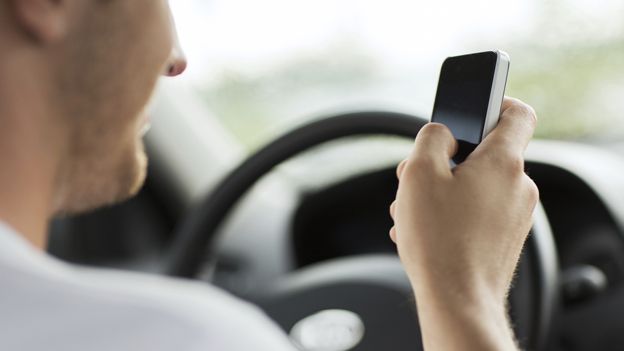Five radical ways to keep drivers off mobiles
- Published

Drivers caught using mobile phones at the wheel should have their penalties doubled to cut the number of road deaths, says the boss of the Metropolitan Police. But what else could be done, asks Justin Parkinson.
Wi-fi lay-bys
In a research paper, brothers Barry and Charles Press raise the idea of "convenient mobile phone pull-out areas with free wi-fi access" on major roads, like the facilities available for people who need a break for tiredness. "It's a bright idea," says Pete Thomas, director of Loughborough University's Transport Safety Research Centre. But the technology needs to to be tested thoroughly before it's possible to assert that it works, he adds.
Signal jamming
Some believe cars should be fitted with mobile signal-jamming devices as an industry standard. "It makes sense," says Alan Kennedy, operations manager at Road Safety GB. "They should have to stop the car before they want to use the phone. You can't rely on people's good intentions." But opponents say it would be difficult to distinguish between phones used by drivers and passengers.
Lying to learners
In 2012 Belgian road safety experts experimented by telling learner drivers on one course a lie - that the government had made it compulsory to prove they could avoid obstacles while texting at the wheel if they wanted to pass their test. The young people who took part in a "texting-and-driving" trial were shocked when they crashed. Instructors asked the learners how they would have felt had the obstacles been children. "They might have been on to something," says Prof Thomas. "It showed them how difficult and dangerous it is to text and drive."
Breaking the habit
Research suggests tightening up rules doesn't have much impact on the problem. Using mobiles in cars is a habit that's hard to break and the act of driving might actually use up the part of the brain - prefrontal cortex - that controls inhibitions, reducing the awareness of risk. Cutting the general reliance on phones the rest of the time is a way to overcome this effect of being at the wheel, it is argued. Or, failing that, prevention, such as designing phones which switch off automatically when they detect they are in a moving car. Or simply telling motorists to put their mobiles in the boot.
Talk to the doctor
Drivers who break the speed limit by small margins can choose to go on a speed-awareness course, teaching them of the dangers, rather than taking points on their licence. Campaigners argue for something stronger - a one-to-one with a doctor who has seen accidents caused by mobile use in cars. "Shocking people only usually changes behaviour for a short while, or a few miles," says Prof Thomas. "There needs to be a comprehensive approach. There's no silver bullet." Alan Kennedy is even more dubious. "This doesn't work," he says. "It could actually make the timid drivers more worried and even encourage the more toe-raggish elements to become more rebellious."
Subscribe to the BBC News Magazine's email newsletter to get articles sent to your inbox.